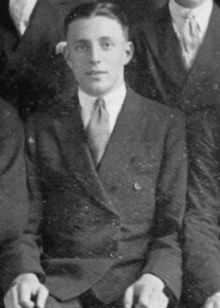Allan La Fontaine
| Allan La Fontaine | |||
|---|---|---|---|
 |
|||
| Personal information | |||
| Full name | Allan La Fontaine | ||
| Date of birth | 15 December 1910 | ||
| Place of birth | Eskdale, Victoria | ||
| Date of death | 14 December 1999 (aged 88) | ||
| Original team(s) | University Blacks | ||
| Height | 175 cm (5 ft 9 in) | ||
| Weight | 81 kg (179 lb) | ||
| Position(s) | Centreman | ||
| Playing career1 | |||
| Years | Club | Games (Goals) | |
| 1934–1942, 1945 | Melbourne | 171 (77) | |
| Representative team honours | |||
| Years | Team | Games (Goals) | |
| 1934, 1936 | Victoria | 2 (0) | |
| Coaching career | |||
| Years | Club | Games (W–L–D) | |
| 1949–1951 | Melbourne | 56 (25–31–0) | |
|
1 Playing statistics correct to the end of 1945.
|
|||
| Career highlights | |||
|
|||
| Sources: AFL Tables, AustralianFootball.com | |||
Allan Faulkner La Fontaine (15 December 1910 – 14 December 1999) was an Australian rules footballer who played with and coached Melbourne in the Victorian Football League (VFL).
La Fontaine was born at the country town of Eskdale, in north-eastern Victoria (Australia). While still a youngster his parents Cyrelle and Beatrice brought the family to Melbourne where they settled in the suburb of Footscray. He had three brothers, Claude, Lionel and Donald. La Fontaine attended St. Joseph's CBC North Melbourne (later St. Joseph's College Melbourne) from 1925 to 1929 where he earned the title Captain of College three years in a row; 1927, 1928 and 1929. While at school he made his mark as both an excellent athlete, handball player and footballer. In 1930 he went on to complete his secondary education at St Kevin's College, Melbourne before proceeding to university where he was eventually granted Bachelor of Science in 1946.
La Fontaine enjoyed a variety of activities which included boxing, cricket and in 1936 working as a seaman on an oil tanker bound for America.
In July 1940 La Fontaine married Mary Williams at St. Patrick's Cathedral. During the second world war he served as a Flying Officer with the RAAF between 1942 and 1945 and saw action in New Guinea and the nearby islands. Two of his brothers served in the Australian Army during the same conflict. On his return he took up his trade as an industrial chemist and analyst in a Melbourne business.
La Fontaine's football career changed dramatically when he was recruited from University Blacks. He was considered a brilliant full-forward, and was to earn his fame playing with the Melbourne Football Club as a centreman. He was captain of Melbourne during their hat-trick of premierships in 1939, 1940 and 1941. La Fontaine went on to coach Melbourne from 1949 until 1951.
...
Wikipedia
